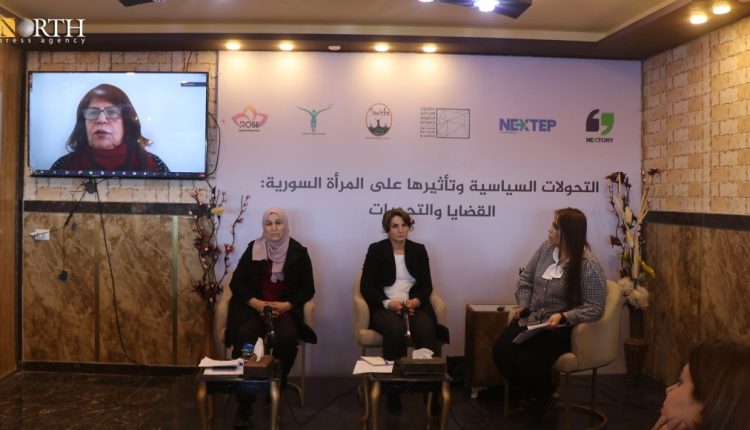
By Avin Youssef
QAMISHLI, Syria (North Press) – Despite the prominent role of women in northern and eastern Syria, especially in the fight against the Islamic State (ISIS), they still face challenges in achieving equality and strengthening the position and rights of women.
Syrian female activists and politicians, who participated in a panel discussion on Mar. 7, in the city of Qamishli, northeast Syria, emphasized the importance of shedding light on the challenges faced by women in difficult circumstances in Syria.
Activists believe that their experience can be leading and motivational for women in the rest of the regions in Syria, provided that there is consensus and effective participation of women.
Social and legal challenges
The violence against women has increased during the Syrian war, as women have been used as a mean to influence societies, especially after the entry of extremist organizations into certain areas, international reports read.
Abeer Hassaf, a human rights activist, believes that women have clear impact on changing public policy and international direction regarding the Syrian file.
Hassaf told North Press the victory of the Women’s Protection Units (YPJ) against ISIS in the city of Kobani, northern Syria, changed the course of the Syrian crisis and the balance of power, resulting in the international alliance with the Women’s Protection Units and People’s Defense Units (YPG), which formed the cornerstone for establishing the Syrian Democratic Forces (SDF).
In addition to their military victories, women in northern and eastern Syria have achieved administrative, political, and legal victories, Hassaf added.
The system of joint presidency has been implemented in institutions, and laws specific to women have been issued, along with women’s participation in shaping the Social Contract of the Autonomous Administration of North and East Syria (AANES) and the inclusion of provisions that protect their rights.
However, Sabah Halak, a feminist researcher and a member of the Mini Constitutional Committee, believes that the duality of courts in north and east Syria is one of the challenges facing women as there is a difference in the laws regarding polygamy, child marriage, arbitrary divorce, and inheritance.
Halak emphasizes that obtaining women’s rights requires efforts from everyone, not just women.
She told North Press that it is a matter of struggle, and if women can establish laws that protect their rights in the constitutional text, it will help them reach decision-making positions.
Leading role in the region
Mona Abdulsalam, a civil activist, pointed out that the laws and legislations in northern and eastern Syria are distinctive and provide significant protection for women. They can be applied in any region, but they require strong will and struggle to achieve freedom and rights.
Despite believing that the experience of the region is a leading one, she emphasized that women in other Syrian regions have the right to choose.
Four years passed since the liberation of the areas that were controlled by ISIS, the implementation of laws related to women remains challenging in those areas.
Hassaf believes that there is still an impact on the rights of women specifically and on the social situation in those areas, as they are still under the influence of extremist ideology.
Halak considers the inability of the AANES to enforce women’s law in some areas as a problem.
She further added the laws in the AANES areas must be unified, and then the issue of generalizing them across Syria should be addressed.
